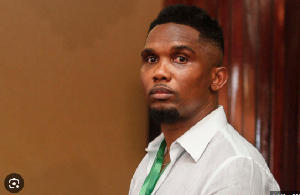 Fecafoot president Samuel Eto'o
Fecafoot president Samuel Eto'o
For a proud country which boasts five continental titles and the most World Cup finals appearances by an African nation, the past two months have seen a very public row play out over who should coach the Indomitable Lions.
Last week Belgian Marc Brys was removed as boss – only to be reappointed within 48 hours.
But the sideshow off the pitch ahead of crunch 2026 World Cup qualifiers is only the tip of the iceberg in a battle for control of the game.
The man now running football in the Central African nation is former Barcelona and Inter Milan striker Samuel Eto’o, a legend of the game on the continent and Cameroon’s record goalscorer, who was elected football federation (Fecafoot) president in December 2021.
But Eto’o has been described as a “dictator” by one former international team-mate because of the way he is steering the organisation – epitomised by the spat with the nation’s Ministry of Sport (Minsep) over Brys.
“Samuel was the biggest player in Africa but there’s a lot of trouble around him,” the retired player, who asked to remain anonymous for fear of a backlash, told BBC Sport Africa.
“He does not listen to advice. When you manage people you do not need to [act] like a dictator.
“I didn’t know he would be like that, and it will be hard for him to continue.”
Players have issued a plea for the team to be kept “politically free” but some fans have become so desperate that they have called on world governing body Fifa to suspend Cameroon.
The curious case of Marc Brys
The arrival of Brys as coach in April, after the departure of Rigobert Song following a last-16 exit at the 2023 Africa Cup of Nations (Afcon), created a storm few would have expected.
Fecafoot expressed its “great surprise” when Minsep announced the appointment of the 62-year-old whose coaching career has been with clubs in Belgium, the Netherlands and Saudi Arabia.
Eto’o's alternative list of high-profile candidates had reportedly included two-time Afcon-winning coach Herve Renard, Italian World Cup winner Fabio Cannavaro and ex-Nigeria boss Jose Peserio.
“The only problem was the salaries,” Cameroonian sports journalist Giovanni Wanneh told BBC Sport Africa.
“Brys is not the best, but we’re not talking about someone we picked from the gutters. Minsep has played this card before and it worked out fine for Cameroon.”
In Cameroon, as is the case in several other African countries, the government pays the salaries of the national team’s coaching staff and feels entitled to weigh into Fecafoot’s affairs.
Eto’o did not turn up to the presentation where Brys signed his contract on 8 April, and their first in-person meeting on 28 May quickly descended into an unseemly row.
Fecafoot reacted by replacing Brys with an interim coach, only to quickly backtrack after pressure was applied by Minsep.
Yet a tense atmosphere continued this week when the Indomitable Lions squad assembled in Yaounde ahead of the visit of Cape Verde in World Cup qualifying on Saturday.
Players were met by two different sets of administrators at the team hotel, and Fecafoot did not provide kit for the first training session due to be held by Brys - leading forward Moumi Ngamaleu to call for unity.
“The responsibility is for you to help keep the team politically free and to maintain a clean environment for us to perform without problems,” his Instagram message read.
“We hereby approach you to overcome the differences, put the ego aside and remember we are all here to put the people of Cameroon on the map and give them honour.”
Manchester United goalkeeper Andre Onana was among several players who reposted Ngamaleu’s message.
A senior Confederation of African Football (Caf) official said it is open to mediating in the row between Fecafoot and Minsep, although such a request is yet to be received.
‘Grave irregularities’ under Eto’o
Eto’o’s treatment of Brys is only the latest instance of his behaviour garnering negative attention since he assumed control of Fecafoot.
“The fact that you are a top footballer doesn't automatically make you a great administrator,” said Wanneh.
“When he came in, I thought he was going to change the narrative in our football. But Cameroon football is living its worst moment.”
In July last year, a group representing amateur clubs in Cameroon called on the 43-year-old to resign, citing "grave irregularities" in the organisation.
That included Eto’o taking an ambassadorial role with a sports betting company - potentially in violation of both Fifa and Fecafoot rules.
Moreover, an investigation by Caf into allegations of improper conduct against Eto’o is ongoing.
“He is the legitimate president of the federation. But nobody is above the law,” Caf secretary general Veron Mosengo-Omba told BBC Sport Africa.
A battle for control
In Cameroonian sport, the influence of President Paul Biya has been keenly felt in the past.
He insisted on Roger Milla being included in the squad for the 1990 World Cup - with the then-38-year-old netting four times - while the appointment of Brys’ predecessor Rigobert Song in 2022 was made “on very high instructions” of President Biya.
It is the government financing and pumping in the money," said Wanneh.
“Fecafoot is not structured in a way that it can cater for its burden and expenditure,” the journalist added. “If it was then we would not have this scenario."
Countries whose governments interfere in footballing affairs are at risk of suspension by Fifa - a fate that has befallen many African nations in the past, including Cameroon - yet Minsep has so far trodden a path which has not provoked the Zurich-based governing body.
While Fifa’s social media channels have been bombarded by messages to take action, Eto’o retains the backing of many Indomitable Lions supporters in his bid to break free of perceived governmental control.